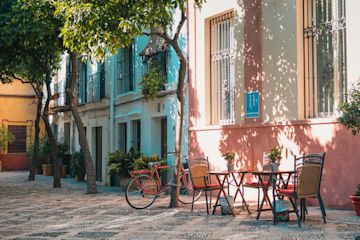
Van Life: This is what a van vacation will cost you
Find out how much a summer vacation with a campervan really costs and what you should pay attention to when choosing the van life for good.
12 min read
If you’ve ever dreamed of living on the road, you’re not alone. Camper vans are more popular than ever these days, and it’s no wonder — from flexible, affordable travel to spending time in nature, homes on wheels have plenty of perks. But choosing this way of getting from A to B also has its downsides. You’re more dependent on the weather, and there’s not a lot of legroom. To help you weigh the pros and cons of a camper van — including how much it might cost — we’ve gathered some practical info and tips to get you started. Let’s go! As with any vacation, the cost of a camper van holiday depends on your tastes and preferences. Do you want to travel abroad or tour around Germany? Is comfort important to you or are you happy with a minimalist setup? Do you want to cook for yourself or would you rather go out to eat? Depending on what your priorities are, expect to spend between €100-300 per day per person while on your trip. Let’s look at some specifics.For fuel, you can calculate costs using the following formula: Wild camping has become very popular in recent years. But in Germany and many other European countries, it’s actually illegal and subject to heavy fines. Plus, you won’t have access to sanitary facilities in the wild — and you’re on your own if worse comes to worst. That’s why it’s almost always better to stay at campsites. The costs vary depending on the destination country. In Italy, for example, a night at a campsite costs €60 on average, compared with €37 in Sweden. In Germany, you pay an average of €38 per night, which is even below the European average of almost €50. Here, too, it makes a difference whether you choose a luxurious campsite or you’re satisfied with a simple parking space for your van.For a ten-day trip, budget at least €400 for campsites. You may need to add the following approximate costs, too: How much money you should budget for food and drinks is hard to estimate. It depends a lot on the country you’re traveling in and whether you cook for yourself or eat out. Plus, you might have the occasional coffee-to-go at the gas station, ice cream at the lake, or beers by the campfire to account for. Generally speaking, you should calculate around €150-500 for ten days.Another important thing: If you plan to cook, you’ll need essentials such as oil and vinegar, spices, gas canisters, and cleaning supplies in addition to some classic kitchen camping equipment.If you spend your summer vacation on the road, a membership with ADAC (the German automobile association) is worthwhile — and it costs just €94 a year. For a 10-day trip, you should also budget around €300 for cultural attractions, sports, and other leisure activities. Water sports in particular can cost up to €150, and entrance fees for national or amusement parks can also be up to €15.Last but not least, vacationing in a camper van also takes time and patience — like if you’re stuck in traffic or if mosquitoes bother you at night. And for better fuel efficiency, you should never drive faster than 110 km/h with a camper, meaning your trip could be longer than you might like. But it’s definitely a good opportunity to slow down and take in the scenery! Whether you should rent or buy a camper van depends on your long-term plans. Keep reading for an overview to help you compare costs.By the way: The terms “caravan,” “motorhome,” and “camper van” are often used synonymously. But a caravan doesn’t drive by itself — you need a car to tow it. Motorhomes or camper vans have their own motor. A van usually refers to a converted transport or delivery vehicle.Motorhome and camper van rental prices vary by country. In Germany, Spain, and Portugal, you can expect to pay around €120 per day. In Scandinavia, it’s more than €200. On average, you'll pay €100-150 per day for a medium-sized van, plus a setup fee for the equipment. You can also rent a converted van privately through platforms such as PaulCamper, which is usually cheaper.In general, the longer the trip, the lower the rental price per day. So, it’s more cost-efficient to stay out on the road for a while. However, before you set off for distant destinations, you should check whether there are any mileage limits on your rental vehicle. Exceeding the limit usually incurs a fee. Also, note that you need to be at least 21 years old to rent a vehicle from some providers. Insurance is generally included in the rental price, but make sure you also take out private liability insurance if you don’t have that yet. Remember to factor in the deposit of €1,500 and cleaning fees of around €100, as well.You can get a new camper van or motorhome starting from €30,000. Fully integrated models (i.e. vehicles that are designed and purpose-built as motorhomes) cost significantly more than partially integrated ones, which are built using a basic vehicle structure and layout. Depending on how many features it has and how fancy it is, you can shell out six-digit amounts for a new motorhome. Used vehicles usually cost less than €10,000. You can get away even cheaper with a converted van. Depending on the vehicle’s age and mileage, you pay around €8,000 for a used van, and in the lowest segment it’s only €1,500 to €2,000. However, it’s worth digging a little deeper into your pocket. If you want to refurbish a very old Sprinter or VW T6, your van might end up with high repair costs and a short lifespan. Not exactly ideal for your future van life.Consider the following costs in your budget calculations: Want to buy a used camper van and fix it up yourself? Here’s a list of the average refurbishing costs. In addition to the right driving license class (Class B for vehicles to 3.5 tons and Class C for up to 7.5 tons), and good planning, there’s one more important thing to consider when traveling by van: Expect the unexpected. Here are a few examples:Is your head already spinning with all the numbers? Luckily, we’ve also got plenty of budgeting tips to help you save. Going on vacation with a camper van doesn’t have to be expensive — simply follow these tips:
Whether you want to save for your summer vacation, your own van, or another big purchase — with N26, no goal is too big or small. Open a premium account and create up to 10 Spaces sub-accounts, then give them names like #camper or #travel, and you’re all set to start saving. Use Rules to automatically move money from your main account to your Spaces every month. This way, your savings can grow automatically and you’ll always stay within budget.All saved up and ready to go? With N26 You, you get unlimited free withdrawals abroad and fee-free transactions worldwide, no matter what currency you’re paying in. Plus, enjoy comprehensive travel insurance, including liability, travel cancellation, and coverage for medical emergencies. If your van is more expensive than expected, apply for a loan of up to €25,000 in minutes, or set up an overdraft plan right in your N26 app.
What does a vacation with a camper van cost?
Fuel costs for a camper van
- Planned # of kilometers / 100 x average fuel consumption x price per liter = Fuel cost
- Liters in your fuel tank / kilometers driven x 100 = Fuel consumption in liters per 100 km
Campsite costs
- Water and electricity (either a flat rate of €5 or a daily price of €0.40-0.80 per kWh, depending on usage)
- Environmental taxes or waste water and garbage fees (€2 per day)
- Tourist tax (€1-3 per person)
- Hot showers (€0.50-1.00; usually coin-operated and on a timer)
- Washing machine and dryer (anywhere from €0.50-5.00 per wash)
- Bottled drinking water (approx. €1.50; although tap water is drinkable in most European countries, some campsites don’t offer clean water for drinking)
- WiFi access (€3-5 per day)
- Sports, leisure, and wellness activities (anywhere from €2-20)
- Pet fees (€2-6 per day if you’re traveling with an animal)
Food costs while camping
Other costs while traveling with a camper van
Should I buy a van or rent one?
Rental costs for camper vans and motorhomes
Should you buy a new camper van or a used one?
- Vehicle registration and license plate (roughly €50)
- Emissions analysis (if necessary, roughly €35)
- Vehicle inspection (approx. €125, every two years)
- Special inspection fees ( (€30 to €100; for imported or custom vehicles)
- Motor vehicle tax (calculated according to the emission class in combination with the total weight — €10-40 per 200 kg — with an upper limit of €800-1,000 per year)
- Motor vehicle liability insurance (€200-1,000 per year; if necessary, comprehensive insurance, extended coverage, travel damage protection, and theft protection)
- Ramps, adapters, cables, and other essential equipment
Renovating your own camper van
- Attachments such as windows and ventilation (€1,400)
- Wood paneling, built-in wardrobes (€2,000)
- Electrical (€1,500)
- Hot water supply and waste water system (€1,100)
- Gas installation (€500)
- Auxiliary heating (€700)
- Air conditioning (€1,600)
- Compressor fridge (€800)
What to consider when vacationing with a camper van
- Unforeseen costs: Whether it's a flat tire, parking damage, or theft, experienced campers have seen it all. That’s why it’s important to plan for a generous emergency fund. €500 is a solid base — but the more, the better. Anything that’s leftover can go straight toward saving for your next trip.
- Bad weather or extreme heat: Anyone who’s been camping at a festival knows how cold and clammy it can get outdoors at night, even in the summer. Heavy rain or extreme heat can also cause problems. Make sure to prepare for any and all kinds of weather, and pack warm fleece sweaters, rubber boots, rain jackets, and umbrellas.
- Illness and accidents: Be sure to pack medication, a thermometer, disinfectant, bandages, and tick tweezers. A hot-water bottle, tea, and tissues are also worth their weight in gold when you have a cold. Make sure you have travel insurance and are covered for medical emergencies abroad.
- Tools, work gloves
- Extension cables
- Headlamps (for nightly walks to the toilet!)
- Batteries, power banks
- A fire extinguisher
- Bug spray
- Games and reading material
Top tips for a cheap camper van vacation
- Use shopping comparison sites and apps to find the best deals on everything you need.
- Book travel as early as possible and get membership cards to benefit from discounts.
- Choose free leisure activities such as hiking trails, forests, lakes, or playgrounds and do free sports like jogging or swimming.
- Look for free cultural activities, such as local museums, historic monuments, or open-air events.
- Take bikes with you or rent them — it’s easier to get around and you’ll save on gas and parking fees.
- Pack as lightly as possible — the heavier the camper, the higher the fuel consumption when driving. In some countries, you also can be fined for driving a vehicle that’s overloaded.
- Don't drive faster than 90-110 km/h to save on gas costs, and take country roads instead of highways to avoid paying tolls.
- Take short, cold showers — it feels great in the summer heat.
- Use solar energy with panels on the roof or on your power bank.
- Cook as much as possible yourself, shop wisely, and eat vegan as much as possible to save on food costs.
- Always close the lid when cooking, even if you're just brewing coffee. It's faster that way, and you’ll save on gas.
- Travel to cheap countries like Germany, Sweden, Estonia, Slovenia, or Croatia. In some countries, the campsites and living costs are cheaper, while in others, there aren’t any road tolls.
- Avoid cities and shopping centers and simply enjoy your time in the great outdoors!
Traveling with N26
Find similar stories
BY N26Love your bank
Related Post
These might also interest youTRAVELWhy winter is the best season for budget travelFrom cheaper flights to luxury bargains, here’s why winter is the ultimate time to travel without breaking the bank.
4 min read
TRAVELKeeping your money safe when traveling abroadHow to secure peace of mind for you and your wallet while you’re out exploring the world.
4 min read
TRAVELHow to travel with friends without any financial stressPlanning a group trip? Here's how to handle shared holiday expenses to keep everyone happy.
5 min read


